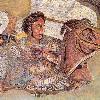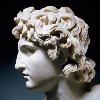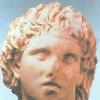

Detail of the mosaic of Battle of Issos Tags: Alexander The Great View |
?? ??? ?????? ??????? ??? ??????? ??????? ??? ??? ???????? ?????? ?????? ??�???? ??? ???????? Tags: Alexander The Great View |
Tags: Alexander The Great View |
|||||||||
Alexander III of Macedon (356-323 BC), popularly known as Alexander the Great (lang-el????? ??????????, M�gas Al�xandros), was a Greek (Greeks)crefi king (basileus) of Macedon. He is the most celebrated member of the Argead Dynasty and created one of the largest empires in ancient history. Born in Pella in 356 BC, Alexander was tutored by the famed philosopher Aristotle, succeeded his father Philip II of Macedon to the throne in 336 BC after the King was assassinated and died thirteen years later at the age of 32. Although both Alexanders reign and empire were short-lived, the cultural impact of his conquests lasted for centuries. Alexander was known to be undefeated in battle and is considered one of the most successful commanders of all time. He is one of the most famous figures of antiquity (Classical antiquity), and is remembered for his tactical (Military tactics) ability, his conquests, and for spreading Greek culture (Ancient Greece) into the East (marking the beginning of Hellenistic civilization).
Philip had brought most of the city-states (polis) of mainland Greece under Macedonian (ancient Macedonians) hegemony, using both military and diplomatic means. Upon Philips death, Alexander inherited a strong kingdom and an experienced army. He succeeded in being awarded the generalship of Greece and, with his authority firmly established, launched the military plans for expansion left by his father. He invaded Persian-ruled Asia Minor (Anatolia), and began a series of campaigns (Wars of Alexander the Great) lasting ten years. Alexander repeatedly defeated the Persians in battle; marched through Syria, Egypt, Mesopotamia, Persia (Iran), and Bactria; and in the process he overthrew the Persian king Darius III and conquered the entirety of the Persian Empire (Achaemenid Empire).crefii Following his desire to reach the "ends of the world and the Great Outer Sea", he invaded India (Alexanders Indian campaign), but was eventually forced to turn back by the near-mutiny of his troops.
Alexander died in Babylon in 323 BC, before realizing a series of planned campaigns that would have begun with an invasion of Arabia (Arabian Peninsula). In the years following Alexanders death, a series of civil wars tore his empire apart, which resulted in the formation of a number of states ruled by Macedonian aristocracy (the Diadochi). Remarkable though his conquests were, Alexanders lasting legacy was not his reign, but the cultural diffusion his conquests engendered. Alexanders importation of Greek colonists and culture to the East resulted in a new Hellenistic (Hellenistic civilization) culture, aspects of which were still evident in the traditions of the Byzantine Empire until the mid-15th century. Alexander became legendary as a classical hero in the mold of Achilles, and features prominently in the history and myth of Greek and non-Greek cultures. He became the measure against which generals, even to this day, compare themselves, and military academies (military academy) throughout the world still teach his tactical exploits.crefiii TOC limit2
Title: Basileus of Macedon
Othertitles: Hegemon (Hegemony) of the Hellenic League (League of Corinth), Shahanshah of Persia, Pharaoh of Egypt and Lord of Asia
Full Name: Alexander III of Macedon
Native Lang1: Greek (Greek language)
Native Lang1 Name1: ????? ??????????crefiv (M�gas Al�xandros),?????????? ? ????? (Al�xandros o M�gas)
Spouse 1: Roxana of Bactria (Roxana)
Spouse 2: Stateira of Persia (Stateira II)
Issue: Alexander IV of Macedon
Dynasty: Argead dynasty
Father: Philip II of Macedon
Mother: Olympias of Epirus (Olympias)
Date of birth: 21-null-20
Birth Location: Pella, Macedon
Date of death: 11-null-10
Place Of Death: Babylon
Reign: 336-323 BC
Predceded by: Philip II of Macedon
Succeeded by: Alexander IV of Macedon, Philip III of Macedon



